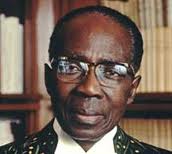
I am sure every African child has read either the entire book or excerpts of ‘L’Enfant Noir‘, ‘African Child‘ by the Guinean author Camara Laye . It is a school classic. When we were in school, the teacher will often give us dictations from this book. The book focuses mostly about Camara Laye ‘s childhood and was written in the 1950s at a time when most African writers were talking about independence, negritude, panafricanism, etc. This earned Laye’s some tough remarks from Cameroonian author Mongo Beti and others about his lack of interest in panafricanism and African independences. Today, I present to you this poem, ‘A ma mère / To my mother‘ of Camara Laye to his mother (published in Coup de Pillon), which is in reality an ode to all African women, and all mothers around the globe. Good to note his mentioning of blacksmiths in this poem, especially given that Camara Laye’s family was Malinke and he was born into a caste that traditionally worked as blacksmiths and goldsmiths. The English translation is by Deborah Weagel. Enjoy!
| A ma Mère
Femme noire, femme africaine, Femme des champs, femme des rivières Ô toi Daman, Ô ma mère, Femme simple, femme de la résignation, Femme noire, femme africaine, |
To my Mother
Black woman, African woman, O mother, I think of you … Woman of the fields, woman of the rivers, woman of the great river, O O Dâman, O mother, who wiped my tears, Simple woman, woman of resignation, O mother, I think of you.
|





